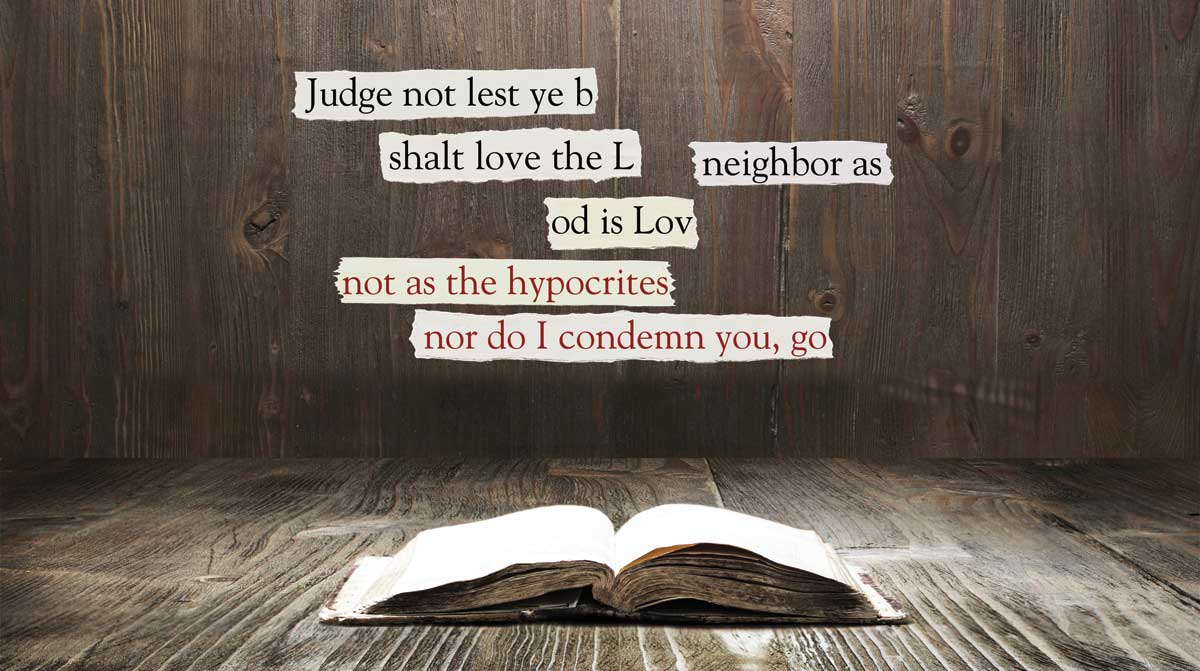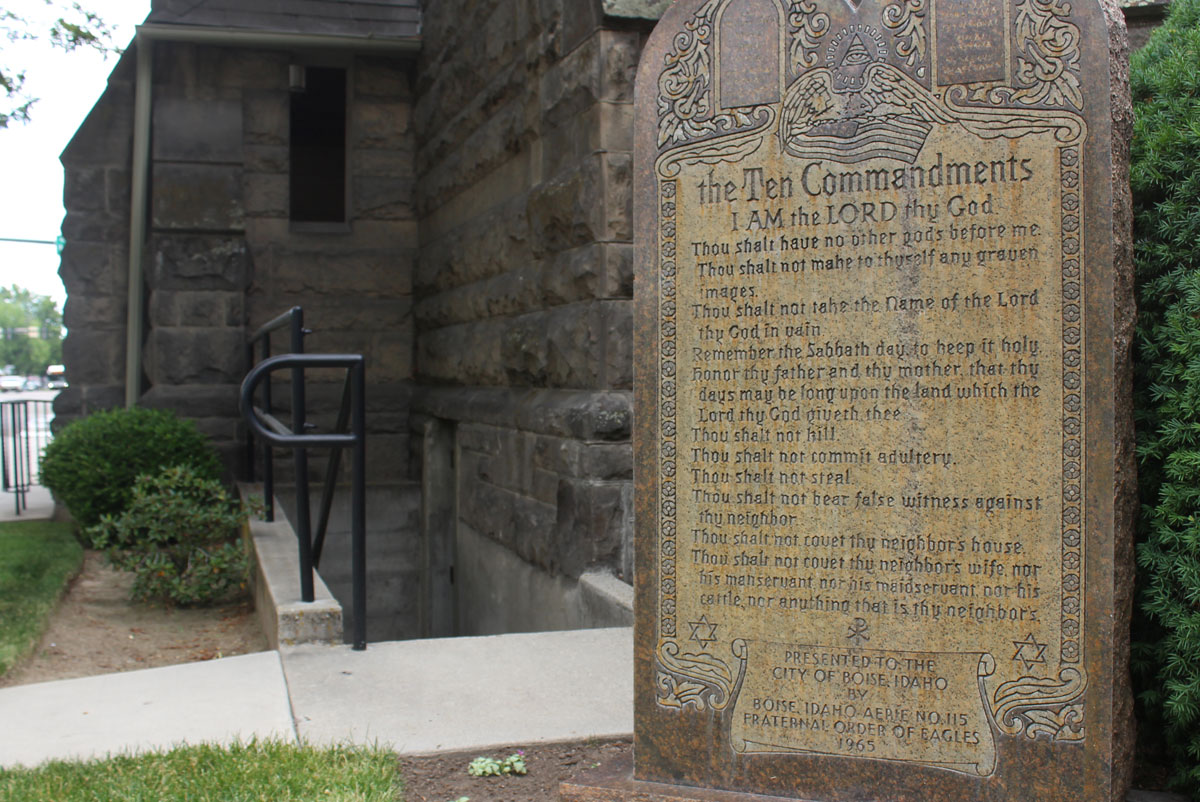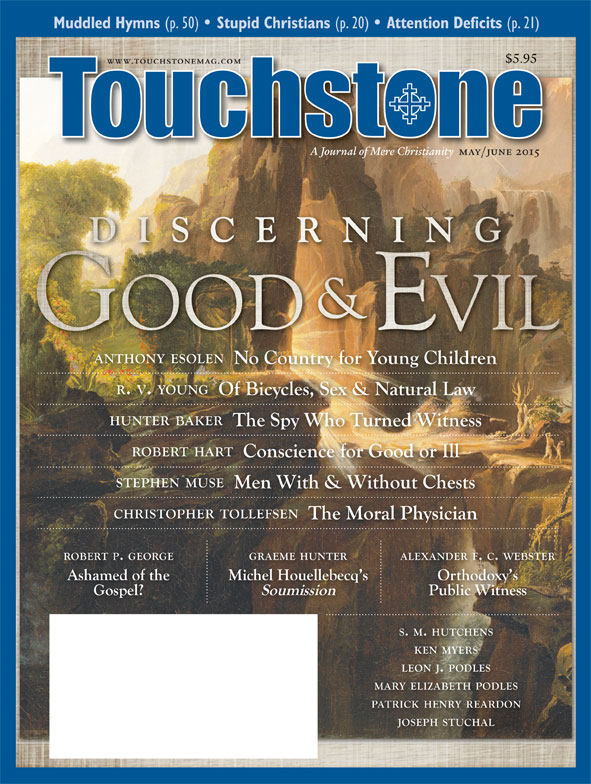Introduction
At some point, every Christian stumbles across someone who thinks he's come up with a doozy of an anti-Christian argument that always begins, "Southern slave holders used the Bible to justify slavery, so . . ."
I recommend responding with an eye roll, but if you just can't help yourself, you might say:
"Oh it was much worse than that! Klansman taught that hatred of the Jews was a necessary component of being a good Christian, ignoring the fact that Jesus, his disciples, and nearly all of his followers in and around Jerusalem were Jews. How could they blind themselves to this obvious contradiction? Easy. That kind of moral relativism happens every time a group of people attempt to separate religion from morality."
As the comedians like to say, "Did you see what I did there?" Well it wasn't me really, but Robert Hart in this 2015 article for Touchstone, Deep Convictions.
—Douglas Johnson, Executive Editor
(read more Editor's Picks)
Deep Convictions by Robert Hart
View
Deep Convictions
Robert Hart on the Formation of Conscience for Good or Ill
On Facebook recently, I saw an interesting survey called, "How pro-life are you? Take the quiz." Generally, I ignore those quizzes, unless something looks particularly interesting to me. Inasmuch as I am completely and actively pro-life, I opened the link and began to read the questions.
The first question was impossible for me to answer. It listed four reasons for the quiz taker—in this case, me—to be pro-life: (1) for religious reasons, (2) for moral reasons, (3) for legal reasons, or (4) for reasons having to do with personal experience. There were no other options, nothing like "All of the above" or any possibility of selecting more than one answer. I had to select one of the four. But I could not choose only one of the answers provided.
One might ask me, "But as a priest, shouldn't you say that your reason for being pro-life is religious?" I could say that it is a reason, but to choose either religious conviction or moral conviction, as if they can be separated in the life of any Christian who is a true believer, should be impossible. To choose between them at all is, at best, misleading. Moral convictions are rooted deep down in the conscience of a human being, and so is faith.
The Christian's approach to all issues of morality must spring from something deeper than only the written letter of statutes and regulations or commandments, even though they are from the Bible. Of course, his position must agree with the commandments and not deviate from them. But a person has the ability to obey a set of rules and regulations without having a properly formed conscience. And because that is so, many individuals can, quite honestly, choose between moral reasons and religious reasons for taking a completely sincere stand for the pro-life cause, and, for that matter, anything.
But there is a danger in responding strictly to one's conscience, unless it has been developed reasonably in accord with basic Christian teaching. Part of the New Covenant is to have the law of God written on the human heart by the Holy Spirit (Jer. 31:31f). That is not the same thing as being merely subjective in one's approach.
Formed by the Word & Dependent on Grace
As a member of the Anglican Catholic Church, I am well acquainted with our founding document, The Affirmation of St. Louis, composed in 1977 at the St. Louis, Missouri Congress, which was called to address crises within the Episcopal Church and the Anglican Church in Canada. Because some of the crises being addressed concerned moral issues (including the sin of abortion), portions of the Affirmation are not just of particular importance to Anglicans, but have an application that is shared among all those who adhere to ecumenical orthodoxy. One of those portions concerns the relationship of Scripture and its proper teaching to the individual conscience of a Christian:
The conscience, as the inherent knowledge of right and wrong, cannot stand alone as a sovereign arbiter of morals. Every Christian is obligated to form his conscience by the Divine Moral Law and the Mind of Christ as revealed in Holy Scriptures, and by the teaching and Tradition of the Church. We hold that when the Christian conscience is thus properly informed and ruled, it must affirm the following moral principles: . . .
The Affirmation then lists the basic moral positions that all of us, as mere Christians, should agree upon. (One of them is "The Sanctity of Human life: Every human being, from the time of his conception, is a creature and child of God, made in His image and likeness, an infinitely precious soul; and that the unjustifiable or inexcusable taking of life is always sinful.")
So, in no way am I saying that a person ought to follow his heart, or "evolve," or any of that trendy sophistry. What I am saying is that the conscience of a Christian must be formed by the Word of God, and that such a conscience is dependent on the grace of God to make it alive. We are not Muslims, and the Bible is not the Koran. The word is not merely external to our consciences; rather, it speaks directly to the human conscience by the Holy Spirit. Therefore, it is the grace of God at work in the human heart.
To separate religious considerations from moral considerations should be impossible for a believer. It is God who has made our consciences sensitive, and it is through our giving ear to his Word that he teaches and forms our consciences intelligently. We therefore cannot choose between religion and morality, dividing them into separate categories, without inflicting serious damage on our own understanding of both.
This realization that the conscience must be "properly informed and ruled" is essential. One of the most important gifts God has given to man is the conscience itself, but alone it can be reduced to nothing more than an emotional reaction. It can be perverted, so that a true understanding of morality is stood on its head.
The Evil Fruits of Badly Formed Consciences
A while back I saw a television documentary about the modern Ku Klux Klan. It was very scary, especially the parts in which Klan leaders gave speeches about hating, in their words, "niggers and Jews." One man ranted, "I hate them because they exist!" And one of the most frightening things about what he said was how he said it. He spoke with the full strength of conviction, and it was quite clear he did so in full accord with his conscience—indeed, motivated by it.
Later in the same documentary, the KKK adults, dressed in their white robes and pointed hoods (though today, by law, they have to keep their faces unmasked), listened as one of their leaders, who was standing by a cross he was about to burn, identified their whole organization as "Christian" and as revering Jesus Christ. The irony of their outward devotion to Jesus, who is known by everyone, except perhaps by them, to have been a Jew and rabbi, was not lost on me. But their invocation of him, and the self-deception necessary for such a claim, was all the more frightening.
This demonstrates the danger of what can happen to a human conscience that is not "properly informed and ruled" by "the Divine Moral Law and the Mind of Christ as revealed in Holy Scriptures, and by the teaching and Tradition of the Church." Standing among the white-sheeted adults were their children, also wearing the white sheets and hoods of the Ku Klux Klan, and being taught by their elders the moral rightness of hating people simply for who they happen to be.
It is not that they are taught that such hatred is permitted. That would be bad enough. Rather, they are taught that such hatred is a necessary component of being a good and decent person, and that not possessing the same hatred makes one evil and immoral. Hence, persons taught from childhood to hate specific groups of people feel not only justified but also virtuous in harboring and expressing that hate. And they feel virtuous in acting on it.
Necessary Teaching
No, the conscience not properly informed will be taught by some power exterior to itself. This is why hate groups can exist. This is how children are taught in "schools" to hate Jews, and to aspire to become suicide bombers. This is how sailors in the slave trade could throw people overboard to lighten the ships. This is what drove the zeal of the Nazi S.S. officers. This is why people march in favor of abortion. The human conscience can be, and often is, perverted.
In the Bible, parents are enjoined to teach their children the commandments of God, in both Testaments. When Jesus gave his Great Commission to "make disciples of all nations," that included "teaching them to observe all things whatsoever I have commanded you" (Matt. 28:18–20). That teaching is absolutely necessary, or the conscience itself can be malformed.
With that teaching, we dare to hope for something deeper to take root in the hearts of all Christians: that the Holy Spirit will write God's laws there for all of us. When the conscience is so formed and empowered by grace, there can be no choice between religious belief and moral conviction, for both are rooted together, intertwined and inseparable.
I could not answer that question in the quiz, and I am grateful that I could not. •
Robert Hart is rector of St. Benedict's Anglican Catholic Church in Chapel Hill, North Carolina (Anglican Catholic Church Original Province). He also contributes regularly to the blog The Continuum. He is a contributing editor of Touchstone.
Order
Print/Online Subscription

Get six issues (one year) of Touchstone PLUS
full online access including pdf downloads for only $39.95. That's only $3.34 per month!
Order
Online Only
Subscription

Get a one-year full-access subscription to the Touchstone
online archives for only $19.95. That's only $1.66 per month!
Order Touchstone subscriptions in bulk and save $10 per sub! Each subscription includes 6 issues of Touchstone plus full online access to touchstonemag.com—including archives, videos, and pdf downloads of recent issues for only $29.95 each! Great for churches or study groups.
Transactions will be processed on a secure server.
more on culture from the online archives

32.4—July/August 2019
Malaise in Malaysia
Will Islamicization Become Its New Future by Peter Riddell

20.8—October 2007
Aliens in Zion
on Why I Can’t Be Just Another Earthman by Louis Markos

29.3—May/June 2016
The Master's Voice
Our Choice Is Obedience or Jesus as Anti-Christ by Anthony Esolen
more from the online archives

19.4—May 2006
Liberalism as Religion
The Culture War Is Between Religious Believers on Both Sides by Howard P. Kainz

32.5—September/October 2019
Must Say No
on When Christians Can't Compromise by Joshua Steely

31.1—January/February 2018
In Defense of Prudery
The Wisdom of the Victorian Quest for Innocence by David Sandifer
calling all readers
Please Donate
"There are magazines worth reading but few worth saving . . . Touchstone is just such a magazine."
—Alice von Hildebrand
"Here we do not concede one square millimeter of territory to falsehood, folly, contemporary sentimentality, or fashion. We speak the truth, and let God be our judge. . . . Touchstone is the one committedly Christian conservative journal."
—Anthony Esolen, Touchstone senior editor
Support Touchstone
00















